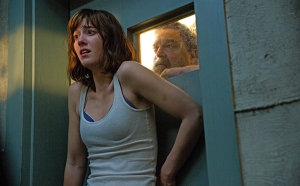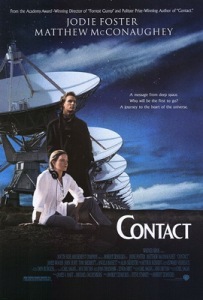
Like with "Zootopia," this is one film I had no interest in seeing until I saw the rating on Rotten Tomatoes. At the moment, "10 Cloverfield Lane" totes a 90% and is advertised as a sequel to the hit-monster movie "Cloverfield."
Over the years, my feelings on Matt Reeves' found footage attack on New York have drastically altered. Initially, I fell in love with the special effects work on "Cloverfield" and thought that there had never been so much detail on a giant monster attacking a city. But over time, better monster films came out and we got to see vibrant and massive monster attacks in films like "Pacific Rim" and 2014's "Godzilla." Not to mention, the shaky cam in "Cloverfield" was unbearable and the characters were less than stellar, making me root more for the city destroying behemoth.
But there was always a hint of mystery and confusion hidden behind the advertisements of "Cloverfield" and this new film is no exception. This made me intrigued about how the two films would connect, or if they would have anything in common. Combine this with the excellent reviews, and I felt like "10 Cloverfield Lane" was a movie worth checking out.
Following an argument with her boyfriend, Michelle (Mary Elizabeth Winstead) has decided to run away. While driving along a dark country road, she is in a car accident and is forced off the road. Mary wakes up with a broken leg and is confused by being chained to the wall. She finds out that her captor, Howard (John Goodman), has taken her inside his underground bunker against her will and repeated tells Mary that she should be thankful that he saved her life. Howard refuses to let Mary leave, saying that there is no world left to return to.

While this film may have been advertised as a successor to "Cloverfield," these two movies fall into vastly different genres. "Cloverfield" was an amalgamation of found footage and monster movies, while this is certainly a thriller, with no found footage in sight (Thank heavens for that). The only thing these two films share is a constant sense of paranoia and uncertainty, and similar speculations about what is attacking the human race.
But "10 Cloverfield Lane" was something that puts it ahead of its predecessor - John Goodman.
"Cloverfield" was so forgettable because of sub-par acting that felt like a slasher horror film and not a constant struggle for survival at the hands of a giant monster. But "10 Cloverfield Lane" immediately steps it up with John Goodman in a role that sees him dominating every scene he's in, as a man who has lost everything to his rampant paranoia about the coming apocalypse. Howard wants to help people, especially his loved ones, but has seen far too many terrible things during his time with Navy to fully trust people.
Goodman plays the role as a man detached from society, only focused on surviving. He seems to have extensive knowledge of "the enemy" even though he's never met them and although he saved Michelle's life, he has no problem harshly disciplining her if she steps out of line or goes against the rules of his bunker. Part of me thought that Howard could have been an alien in disguise, as Howard's strange emotions and lack of basic compassion for others was more than a little odd.

This is a role unlike anything John Goodman has played before, but plays to his strengths. Goodman is excellent at switching from content and kindness to unbridled anger and make it seem like the most natural thing in the world. Any Coen Brothers film he's been in will show that. But now we see John Goodman play an unhinged man who isn't afraid to break out a barrel of acid to keep his "captives" in check, and then offer them dinner. Or perhaps he isn't a man at all.
Outside of Goodman's performance, "10 Cloverfield Lane" is satisfactory. Nothing stands out, but there isn't anything the film did wrong either. It plays out like the captive thriller that you would expect, with the captor being the best part, and the overwhelming sense of confinement and paranoia driving most of the film. Michelle and the other member of their little dysfunctional family, Emmett (John Gallagher Jr.), are crafty and intelligent enough that their struggle to find out what's going on and break free is intriguing and never gets dull or predictable.

Near the end of the film, we do get our connection to "Cloverfield," especially if you looked into any of the theories surrounding the monster attack on New York. That was to be expected though, and does not come as a surprise to me.
Overall, John Goodman is the reason worth seeing "10 Cloverfield Lane." His performance takes an already good thriller and turns into a fascinating one, where you're never too sure what is going to set him off. If you're a fan of John Goodman's acting or you're curious about what happened in "Cloverfield," give this one a watch. If you don't like claustrophobic movies or thrillers about the end of the world, don't bother with this.
Final Grade: B-













